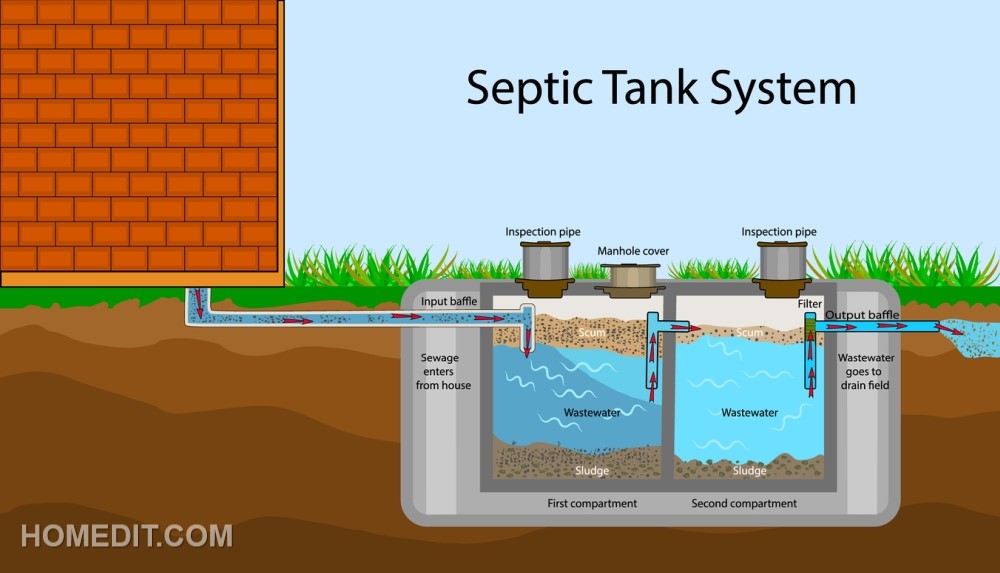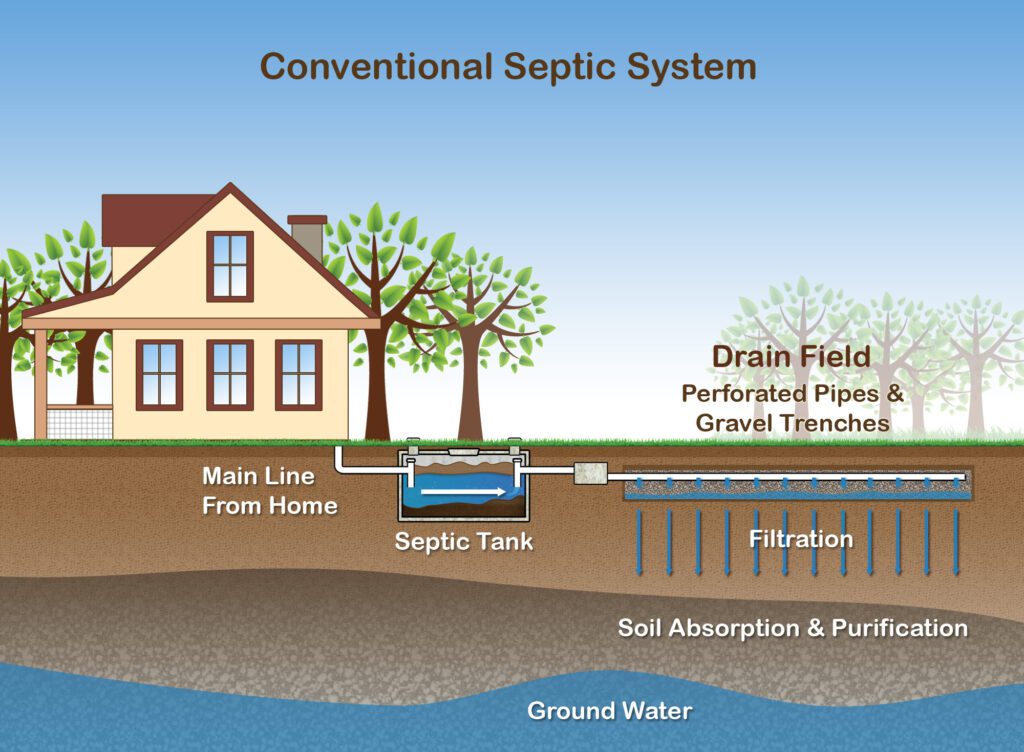Maintaining a septic tank is crucial for the overall functioning and longevity of your system, but you may be wondering if there are any simple home remedies that can help with this task. While professional services are always recommended for complex issues, there are a few natural steps you can take to ensure a healthy septic system. From regular inspections to proper waste management and drainage, incorporating these home remedies into your routine can go a long way in keeping your septic tank in optimal condition.

Understanding the Septic Tank System
Definition of a septic tank
A septic tank is an underground wastewater treatment system commonly used in areas without access to public sewage systems. It is made of a watertight container typically made of concrete, fiberglass, or polyethylene, and it is designed to hold and treat wastewater coming from your household.
How a septic tank works
The septic tank system works by allowing solid waste and heavy substances to settle at the bottom of the tank, forming sludge, while lighter materials like oil and grease float to the top, forming scum. The liquid wastewater, known as effluent, sits in the middle layer and exits the tank to enter the drain field for further treatment.
Importance of septic tank maintenance
Proper maintenance of your septic tank is crucial to ensure its efficient operation and prevent costly repairs or replacements. Regular maintenance helps prevent issues such as clogged drain lines, overflowing or backup, foul odors, and slow draining fixtures. By taking care of your septic tank, you can extend its lifespan and maintain a healthy and functional system for your home.
Common Issues with Septic Tanks
Clogged drain lines
One of the most common issues with septic tanks is clogged drain lines. This can occur due to excessive use of water, improper disposal of non-biodegradable items, or the accumulation of solid waste in the drain lines. When the drain lines become clogged, it can cause wastewater to back up into your home or create slow draining fixtures.
Overflowing or backup
When a septic tank becomes overfilled with solids, it can result in overflowing or backup. This can be caused by neglecting regular pumping and maintenance, excessive water usage, or a septic tank that is too small for the household’s needs. Overflowing or backups can create unsanitary conditions and pose health risks to you and your family.
Foul odors
Foul odors emanating from your septic tank or drain field are another common issue. These odors can be caused by a buildup of gases, such as hydrogen sulfide, methane, and ammonia, or the presence of decaying organic matter. If you notice persistent foul odors around your septic system, it is important to address the issue promptly to prevent further complications.
Slow draining fixtures
If your sinks, showers, or toilets are draining slowly, it may indicate a problem with your septic tank. Slow draining fixtures can occur due to clogged drain lines, a full septic tank, or a malfunctioning septic system. Ignoring this issue can lead to more significant problems, so it is important to address any slow draining fixtures promptly.

Septic Tank Maintenance Basics
Regular inspection
Regular inspection of your septic tank is crucial to detect any potential issues before they become major problems. A professional inspector can assess the condition of your tank, check for leaks or cracks, and ensure that all components are functioning properly. Ideally, septic tanks should be inspected at least once every three years.
Pumping the septic tank
Pumping your septic tank on a regular basis is essential to prevent the accumulation of solid waste and allow for proper functioning. The frequency of pumping depends on factors such as the size of your tank and the number of people in your household. As a general guideline, most septic tanks should be pumped every three to five years.
Avoidance of harmful substances
To maintain a healthy septic tank, it is important to avoid disposing of harmful substances down the drain or toilet. This includes chemicals, grease, medications, non-biodegradable items, and excessive amounts of household cleaners. These substances can disrupt the natural balance in the septic tank and hinder the proper treatment of wastewater.
Efficient water usage
Conserving water and using it efficiently can significantly reduce the strain on your septic tank. Be mindful of your water consumption by fixing any leaks, installing water-saving fixtures, and practicing water-conserving habits, such as taking shorter showers and running full loads of laundry and dishes. By reducing water usage, you can lessen the workload on your septic tank and prolong its lifespan.
Benefits of Home Remedies for Septic Tank Maintenance
Cost-effective alternative
Using home remedies for septic tank maintenance can be a cost-effective alternative to hiring professionals or purchasing expensive products. Many of these remedies involve using common household items that are readily available, making them budget-friendly options for septic tank care.
Environmentally friendly
Home remedies for septic tank maintenance often utilize natural ingredients that are environmentally friendly. By opting for these remedies, you can reduce your reliance on harsh chemicals that can harm the environment and groundwater.
Non-toxic to the septic system
Unlike some commercial products that may contain harmful chemicals, home remedies for septic tank maintenance are typically non-toxic to the septic system. This reduces the risk of damaging the beneficial bacteria and organisms responsible for breaking down waste in the septic tank.

Top Home Remedies for Septic Tank Maintenance
1. Regular Septic Tank Pumping
Regular pumping of your septic tank is the most critical aspect of maintenance. By removing accumulated solids, you can prevent clogs, backups, and potential damage to your system. Consult a professional to determine the appropriate pumping frequency based on your tank size and household needs.
2. Proper Waste Disposal
Proper waste disposal is essential for maintaining a healthy septic tank. Avoid flushing non-biodegradable items, such as wet wipes, sanitary products, or paper towels, as they can clog the system. Opt for septic-safe toilet paper that breaks down easily to prevent obstructions.
3. Use of Baking Soda and Vinegar
A combination of baking soda and vinegar can serve as a natural cleaning agent for your septic tank. Periodically pouring a mixture of these ingredients down the drain can help break down organic matter and keep the system functioning efficiently.
4. Maintenance of Drain Field
Regularly inspect and maintain your drain field to ensure proper wastewater distribution and absorption. Avoid parking vehicles or placing heavy objects on the drain field, as this can compact the soil and inhibit proper drainage.
5. Monitoring Water Usage
Be mindful of your water usage and avoid excessive water consumption. Limiting showers, fixing leaks promptly, and using water-saving fixtures can help reduce the strain on your septic system and prolong its lifespan.
6. Installation of Effluent Filters
Install effluent filters in your septic tank to trap solid particles and prevent them from entering the drain field. These filters can improve the overall efficiency and longevity of your septic system.
7. Avoidance of Chemical Cleaners
Avoid using chemical cleaners or excessive amounts of household cleaners, as they can disrupt the natural balance of bacteria in your septic tank. Opt for environmentally friendly alternatives or natural cleaning methods whenever possible.
8. Utilization of Enzyme Additives
Enzyme additives can help maintain a healthy bacterial balance in your septic tank. These additives introduce beneficial bacteria into the system, enhancing the breakdown of waste and reducing the risk of clogs or backups.
9. Proper Landscaping
Ensure proper landscaping around your septic system by avoiding planting trees or shrubs with extensive root systems near the drain field. These roots can penetrate and damage underground pipes, leading to costly repairs.
10. Check for Leaks and Fixtures
Regularly inspect your plumbing fixtures and pipes for leaks and address any issues promptly. Leaks can overload your septic system and cause unnecessary strain, compromising its efficiency.
Precautions and Additional Tips
Avoid flushing harmful substances
To maintain the health of your septic tank, avoid flushing harmful substances down the drain. This includes bleach, gasoline, oil, paints, pesticides, and medications. These substances can disrupt the natural processes in the septic tank and harm the environment.
Use septic-safe toilet paper
Using septic-safe toilet paper that breaks down easily can help prevent clogs and backups. Look for products that are labeled as septic-safe or biodegradable.
Keep heavy machinery away from the drain field
Avoid driving or parking heavy machinery or vehicles over the drain field. The weight and pressure can compact the soil, hinder drainage, and potentially damage the pipes and distribution system.
Regularly inspect the septic tank
Schedule regular inspections with a professional to ensure the overall health and proper functioning of your septic tank. They can identify any potential issues and provide recommendations for maintenance or repairs.
Consult a professional if experiencing issues
If you experience any issues with your septic tank, such as backups, foul odors, or slow draining fixtures, it is important to consult a professional. They have the expertise to diagnose and address complex problems in your septic system.

Conclusion
Understanding the septic tank system and properly maintaining it is essential for the health and functionality of your home. By following the basics of septic tank maintenance and considering the use of home remedies, you can save costs, protect the environment, and ensure the longevity of your septic system. Remember to consult professionals for regular inspections and address any issues promptly to avoid costly repairs or replacements. With proper care, your septic tank can efficiently manage your household’s wastewater and contribute to a clean and sustainable environment.
